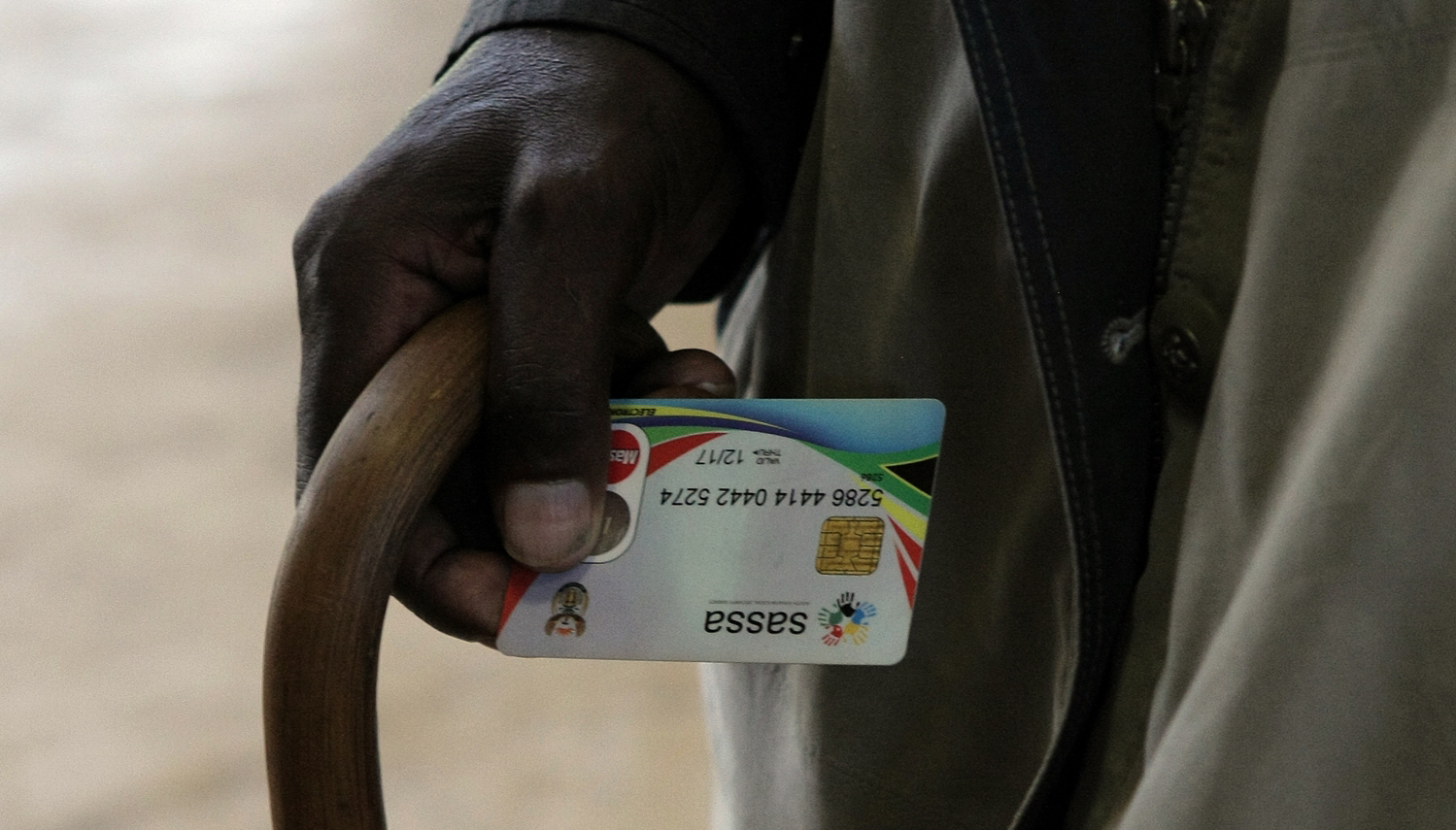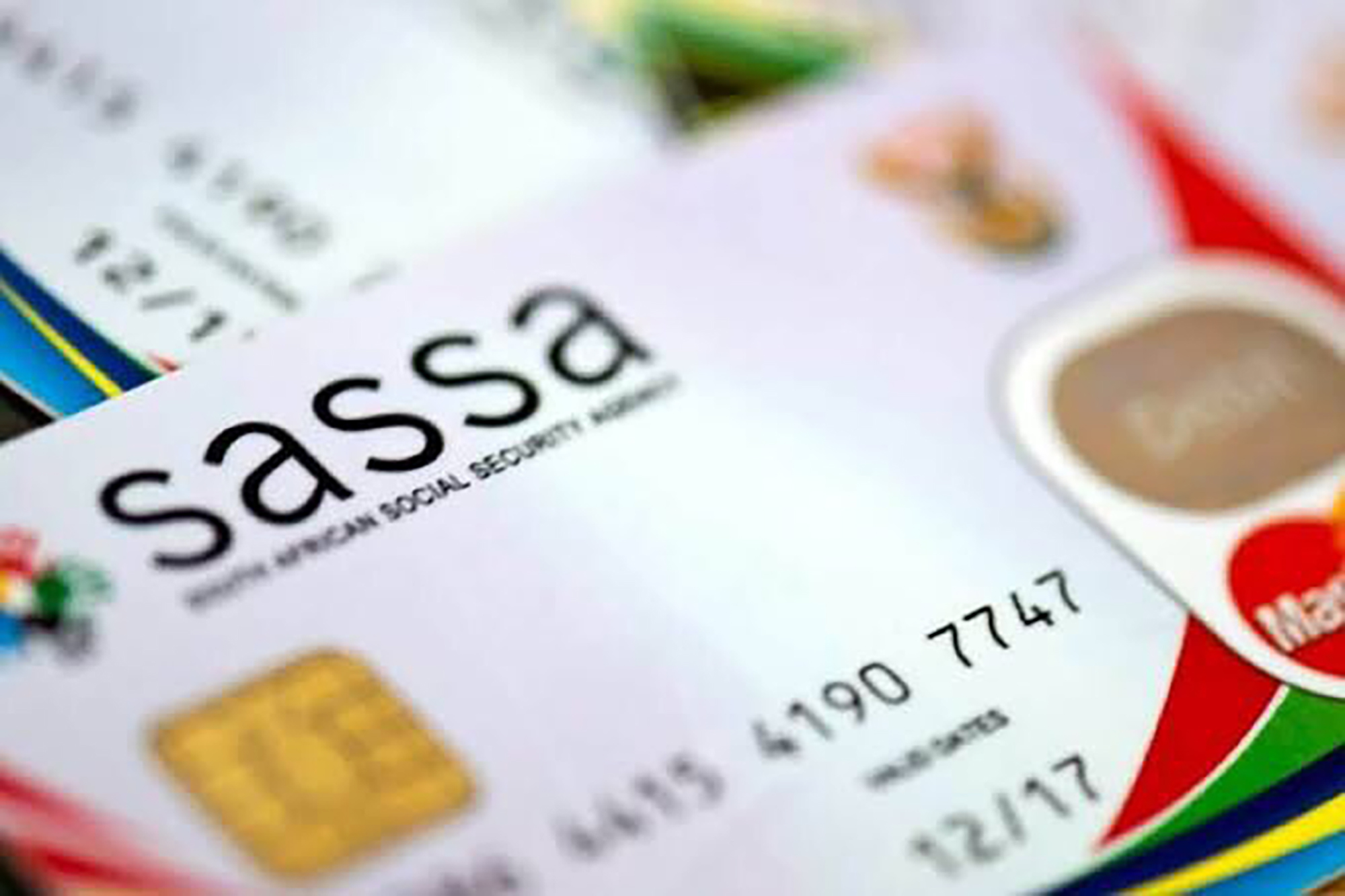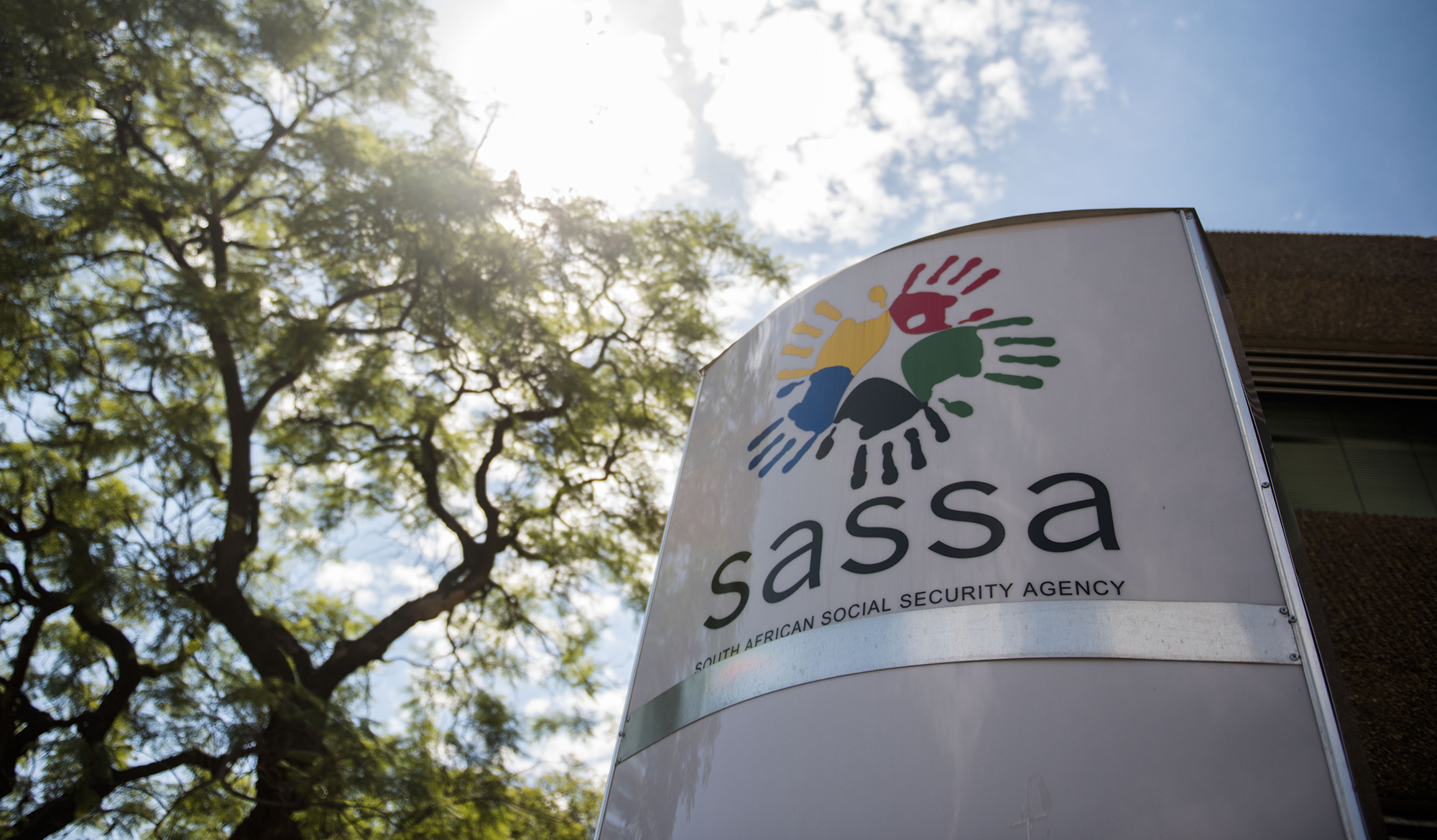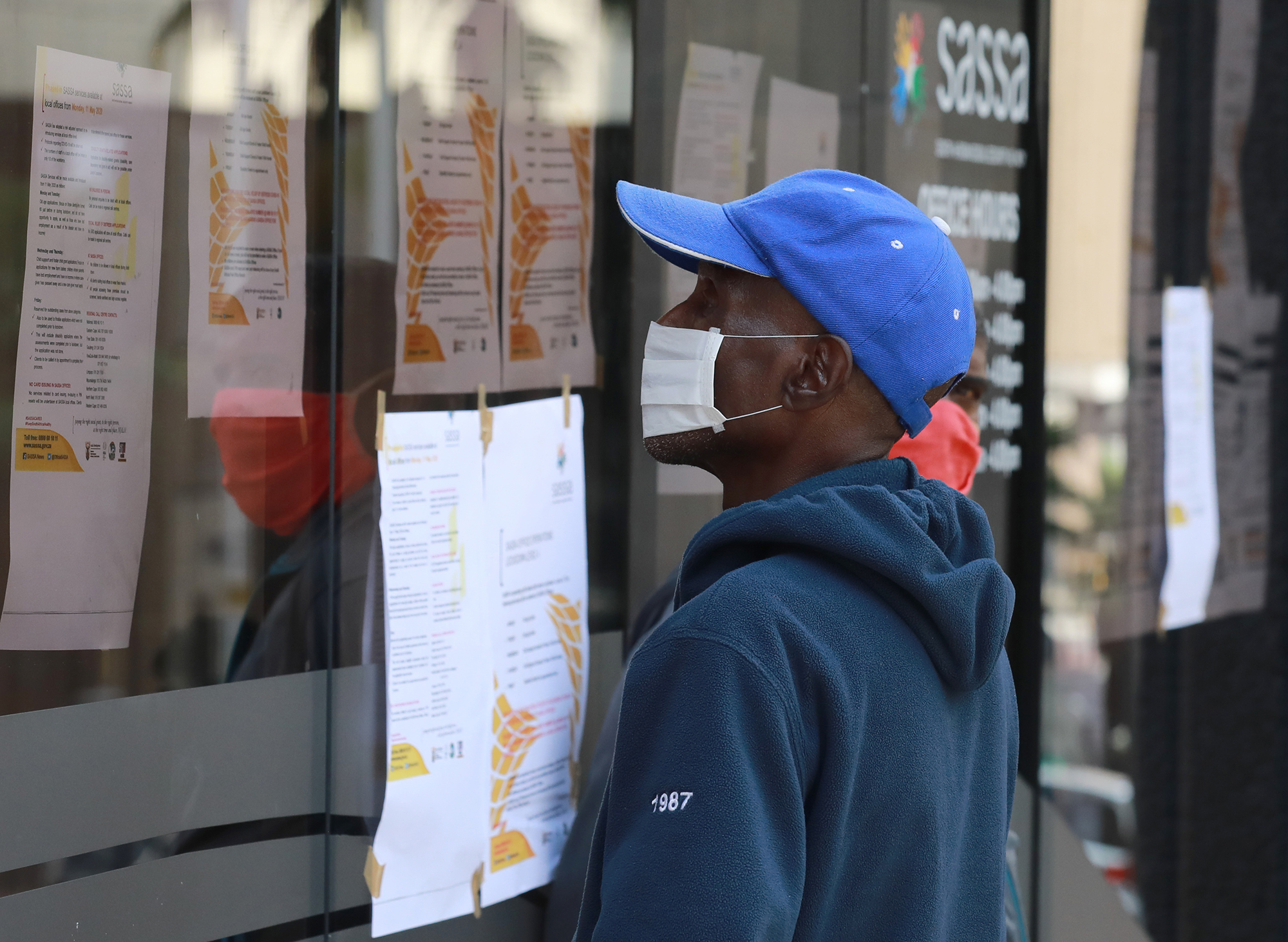AMABHUNGANE
How Postbank came to the brink of a social grant payment meltdown

Revealed — payment disputes almost crashed South Africa’s multibillion-rand social grant system more than once in 2021, forcing Postbank to irregularly cough up for services it was supposed to have been delivering itself in the first place.
On 13 February 2021, FSS Technologies, the service provider that manages the social grant payment system for Postbank, pulled the plug on grant access for two hours — the dramatic culmination of months of fruitless negotiations to get the state-owned company to pay for a key part of the service FSS provides.
A Postbank board memorandum, dated 15 September, written by then interim chief executive Molatlhegi Kgauwe, read:
“About 120,000 beneficiaries amounting to about R204-million could not access their grants as management frantically engaged FSS to restore the service.”

A pensioner holds his Sassa card at a grant collection point in Mpumalanga. (Photo: Gallo Images / Sowetan / Sandile Ndlovu)
These numbers seem to refer only to people who tried to transact or withdraw cash in those two hours.
By 19 February, following the “frantic” engagements, a Heads of Agreement (HoA) was signed with FSS Technologies, the Indian provider of Postbank’s Integrated Grant Payment System (IGPS), to pave the way for a system of per-transaction payments.
Later, external lawyers said the HoA was unenforceable or even unlawful, leading to a conundrum for Postbank: keep paying and break the law or don’t pay and risk collapsing the social grant system.
“The impact of not being able to pay grants would have been untold suffering of the innocent beneficiaries and a possible national crisis as well as irreparable damage to Postbank’s reputation and goodwill,” Kgauwe wrote in his board memo.
According to Kgauwe, the shaky deal allegedly led to at least two other credible threats to shut down the grant system in September 2021.
National Treasury has to date not been formally asked to condone this “contract”, which was effectively agreed to without a tender.
The interruption of service led the South African Social Security Agency (Sassa) to fine Postbank R17-million for the breach of its contract, under which Postbank makes grant payments on behalf of Sassa.
At issue is a crucial additional service to the IGPS called a payment switch, which FSS had provided to Postbank free of charge for two and a half years without any written contract.
Load shedding is here to stay for (at least) another year, while the government dithers on policy
The switch is a system for matching two ends of a transaction. Without a switch, Postbank would have no access to the national payment system and grant recipients would not be able to withdraw funds from other banks’ ATMs or use pay points with their Sassa cards.
The free use of the FSS switch was meant to be a six-month transitional arrangement after the South African Post Office (SAPO) took responsibility for grant payments in 2018 and pending the upgrade of its own existing payment system called Postilion.
The contract with Sassa to distribute grants was subsequently ceded to SAPO’s subsidiary, Postbank. This transfer is a step towards the planned unbundling and corporatisation of Postbank as a standalone entity.
SAPO/Postbank, however, have failed to upgrade Postilion or develop their own capabilities, which means they have continued using FSS’s switch without paying for it.
Postbank has allegedly benefited handsomely from the free ride. In a separate internal brief dated 2 September, Postbank’s manager for legal services, Nonhlanhla Mtshali, explained:
“Postbank has been using the unlicensed FSS switch for over 29 months, resulting in over 857,759,375 in Sassa card transactions being processed from August 2018 till December 2020, generating a significant amount of revenue to Postbank in the form of Automated Teller Machines (ATM) and Point of Sale (POS) terminals service charges.”
In other words, Postbank was raking in the revenue while incurring none of the costs.
The numbers are far from trivial. SAPO’s latest available financial results show that the transaction fee revenue from distributing grants is slightly more than R800-million per year. If the switch was paid for this would add more than R90-million to the expenses related to grant distribution.

A Sassa card. (Photo: Twitter)
‘We thought it was free’
The payment switch fiasco seemingly demonstrates a shocking level of internal confusion about the ceding of the Sassa contract to Postbank in 2020, with Postbank personnel not understanding that they were inheriting a dispute with a crucial service provider.
According to Kgauwe’s board memorandum: “Once the contract was ceded to Postbank, the service provider continued to make demands for the payment of the switch. It appears that at the time Postbank personnel were under the impression that the switch came as part of the package with the IGPS… The demand for payment was a continuation from SAPO… FSS had communicated then to SAPO that the switch service was going to be disrupted with effect from 31 December 2020… Postbank initially pushed back on the demand, proclaiming that the switch was part of the tender for the IGPS.”
As it turned out, Postbank was able to stall until February 2021 before FSS briefly made good on its threat to shut down the grant system and forced the state-owned company’s hand.
The Heads of Agreement hurriedly put together after the brief shutdown laid out the basic deal that would have to be put to Treasury for condonation since it would be a deviation from the existing FSS licence agreement for the IGPS.
The terms were a R0.21 fee per transaction using the Postbank-issued cards by more than eight million Sassa grantees until the IGPS contract ends in March 2023. That amounts to roughly R7.5-million per month or R90-million per year, depending on grantees’ level of activity. A 10% cancellation penalty would apply if Postbank managed to get its own system up and running before the contract runs its course.
While all of this was happening, FSS was in the process of ceding its licence agreement with Postbank to its local partner, Electronic Connect (EC), a process that was concluded in June. From then, FSS would provide services via EC.
Then things went pear-shaped again.
Damned if you do, damned if you don’t
In June 2021, EC sent Postbank an invoice, in accordance with the terms in the HoA, for R31.47-million for January to April.
Postbank paid in July despite the seemingly flimsy legal basis on which to do so.
Despite the HoA, no formal contract has been concluded and Postbank had not applied to National Treasury for condonation — and still has not.
EC kept sending invoices for June through to August, demanding payment of R43.7-million, but Postbank stopped paying them.
“On receipt of subsequent switch usage invoices, the Acting CFO raised concerns on the Heads of Agreement entered into between FSS/EC and consequently payment of the related invoices. Her concern is that the Heads of Agreement is not a binding contract and consequently we don’t have to pay,” said Kgauwe.
The situation came to a head in September when EC allegedly sent a letter of demand, warning that “they can no longer guarantee to make this Switching service available to Postbank due to unpaid invoice”.
To complicate things further, FSS separately waded in, claiming that EC was not paying it and that this also “may potentially impact the grants payment service”.
EC chief executive Zamo Mthiyane’s version differs somewhat.
In response to questions, he said that “once a customer has bought a licence then they can use it as per agreed terms. It is therefore impossible for EC/FSS to disrupt any service as we purely license software. If the software licence has not expired then it will work.”
If you bought a licence from Microsoft and “this licence expires because you have not renewed it, then you cannot blame Microsoft for disrupting your service”, he said.
Kgauwe’s advice to the board was that they pay up “to avert the potential risks alluded to above and a possible national disaster due to possible grant payment disruptions”.
Postbank would just have to accept that this would be considered irregular expenditure, he said.
This directive followed seriously contradictory internal and external legal advice to Postbank.
An “urgent” external legal opinion commissioned from law firm Bowmans in September unambiguously absolved Postbank of any obligation to pay EC, notwithstanding the practical dangers.
According to the opinion, Postbank had, from at least January 2021, warned FSS that a deal would be contingent on approval from Treasury.

Postbank had, from at least January 2021, warned FSS that a deal would be contingent on approval from Treasury. (Photo: Gallo Images / Alet Pretorius)
“Given this requirement, it would not be possible for the Heads of Agreement to stand on its own absent the approval from National Treasury, as such agreement would likely be conditional in nature (at best) or unlawful (at worst),” reads the Bowmans opinion. “Postbank is not obligated to make payment of the invoices issued to it by Electronic Connect in terms of the Heads of Agreement.”
Mtshali (Postbank’s legal manager) however took a diametrically opposite view and advocated strongly for paying EC:
“A strict interpretation of the Heads of Agreements is that they are not a contract but are rather an intention to agree or an agreement to conclude a contract… Perhaps an important doctrine that may be of assistance in relation to this matter is the substance over form common law doctrine. The doctrine allows a court to ignore the form of a disguised transaction and to examine the true nature of the transaction in question,” she wrote to the board.
“It is not disputed that the crucial services of Electronic Connect (as well as those that were provided by FSS) have been consumed and thus Electronic Connect is entitled to receive payment. Postbank cannot be without the switch service rendered by Electronic Connect.”
Mtshali reverted to Bowmans for additional clarity which highlighted the Catch-22 situation Postbank found itself in.
According to Bowmans, “there can be no basis on which Electronic Connect can lawfully invoice Postbank for use of the ‘payment switch’ ”.
At the same time, “any gains that Postbank had accrued as a consequence of the use of the ‘payment switch’ are likely to constitute an unjustified enrichment, which claim will need to be brought by Electronic Connect should it feel the need to recover its fees”.
Before the deal between Postbank and EC can be properly regularised, Treasury still needs to give the thumbs up. However, this seems unlikely any time soon.
In Kgauwe’s board memo in September he noted that “the information gathering for the condonation process is currently under way with the assistance of SAPO Internal Audit”.
In response to questions this month, Treasury said it “has not received an application from Postbank”.
Try, fail, repeat
SAPO’s takeover of the social grant system has been marred by controversy from the start. There was almost immediately a breach in the system’s security leading to the theft of R56-million from grantees’ accounts between 2018 and 2019. A cyber attack, likely carried out from the inside, led to the theft of another R90-million in 2021 from Postbank, as reported by amaBhungane.
Postbank has long tried to achieve its own access to the national payment system and produce “EMV”-compliant bank cards — the now-ubiquitous “smart” cards carrying golden microchips.
Postbank also has long-term aspirations to become a fully licensed state-owned bank — something self-evidently impossible without basic financial service abilities, such as a switch system.
“SAPO already had the switch on which it ran the core banking system, namely the Postilion switch… the plan was that this switch was to be used to produce EMV-compliant Sassa cards as this was the requirement and condition of awarding the Sassa contract to SAPO. After numerous attempts this switch failed to produce the EMV-compliant Sassa cards,” Kgauwe said in his memo to the Postbank board.
In 2020, Treasury gave Postbank a R13-million deviation to get the job done by March 2021 at the latest. Once again, this deadline was missed.
Kgauwe claims that in the middle of last year’s mess, Postbank finally managed to sort out its own switch.
“Postbank only recently, in August 2021, managed to get an EMV-compliant switch,” he told the board.
There is, however, no indication that Postbank is abandoning its relationship with EC. On the contrary, the two seem to have smoothed things out.

A man at a South African Social Security Agency office in Cape Town during the Covid-19 lockdown in May 2020. (Photo: Gallo Images / Nardus Engelbrecht)
In response to questions, Postbank denied there is any conflict:
“There is no challenge or dispute between Postbank and Electronic Connect. All engagements between Postbank and Electronic Connect fall within the scope of normal course of business engagements that Postbank would naturally enter into with any of its service providers as part of its management of the business and contractual relations.”
“Electronic Connect’s invoices for services rendered have been paid in terms of the agreement between the parties, which includes consideration in lieu of historic payment switch services usage.”
EC’s Mthiyane likewise told amaBhungane that the grievances causing last year’s panic have been resolved.
“I can confirm again that we don’t have a dispute with Postbank. I can also confirm that Electronic Connect, like any service provider would do, from time to time raise concerns/dissatisfaction with a customer. These concerns could range from service management issues to late payments. I can confirm that all issues that we have escalated at Postbank have been resolved amicably.” DM
The AmaBhungane Centre for Investigative Journalism is an independent non-profit organisation. We co-publish our investigations, which are free to access, to news sites like Daily Maverick.
For more, visit us at www.amaB.org


















 Become an Insider
Become an Insider
Sassa cards are discriminatory and people should have a normal savings account with a very low transaction fee supplied by the commercial banks By law. End of story. We don’t need a state bank we need bank fees that reflect the service not buy the bank!
Typical ANC scenario – stuff the organisation with incompetent cadres and wait for the wheels to fall off .